The War on Treatment Is Fiercer Now Than Even Covid Itself
Our writer got covid. She used life-saving protocols...and a little ingenuity.
This article is part of a publishing collaboration between Rescue and Trial Site News. The outstanding reporting by Mary Beth Pfeiffer will be simultaneously published in both outlets. Please subscribe to Rescue and Trial Site News for incisive pandemic reporting.
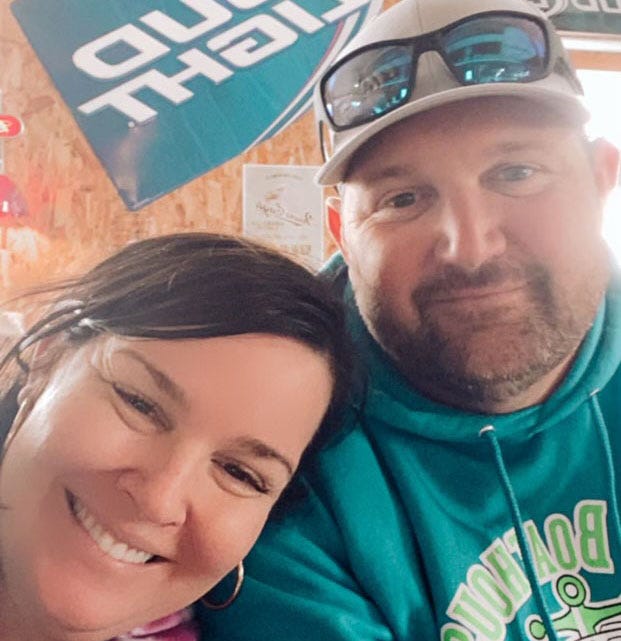
Omicron is tearing through the country, with Covid cases quadrupling and quintupling in thirty-five states from last winter’s peak.
That’s the bad news, but only sort of.
The good news: For the first time in twenty-two months, experts are uttering words we haven’t heard in answer to the central question: Are we nearing the pandemic’s end?
“I think we are,” said Dr. Pierre Kory, a pulmonary and critical care specialist and president of the Front Line COVID-19 Critical Care Alliance.
“I am optimistic for this,” said Dr. Harvey Risch, a Yale epidemiologist and treatment advocate. “The more Omicron cases the better until the peak starts to turn downward.”
These two early treatment pioneers echo the sentiments of other experts, some guarded but mostly hopeful, that the highly transmissible, less-virulent Omicron may end covid as we know it.
“I’m so happy that Omicron is milder, that Omicron is winding up the pandemic,” said Dr. Mobeen Syed, known to a half-million subscribers of Drbeen Medical Lectures on YouTube.
From France, treatment advocate Dr. Christian Perronne, author of the aptly titled, Is There A Mistake They Didn’t Make?, told me, “It could be the end of the pandemic soon.”
By all indications, the U.S. and Europe—where a “west-to-east tidal wave” is unfolding—will follow the South Africa-United Kingdom model. There, Omicron rose and fell fast, obliterating the more fearsome Delta, and leading to far lower rates of hospitalization and death.
Experts are anxiously waiting for that to happen in exploding Omicron hot spots like the United States. But one certainty remains. The U.S. and first-world governments still do not want doctors to treat covid early and are doing all it can to stop them.
This article covers that ongoing problem, how to adapt to a veritable blockade on safe effective generics, and how I got around those obstacles when I got sick.

‘I Would Not Be Here’
When Dr. Mollie James was infected with covid in March of 2020, she was working in an ICU ward in New York City, the hell of the exploding pandemic. She toughed it out because that’s all there was.
When she got sick again recently, she took a menu of trial-tested generic drugs. By then, she knew early treatments that worked—essential knowledge that is denied today, not by happenstance but by one-size-fits-all vaccine mania.
Like Dr. James, I got covid in late 2021. I, too, was treated early—before the dreaded drop in blood oxygen that drives the untreated to hospitals. I did fine. Many people my age—north of sixty—have suffered greatly, and some have died because they were not treated at first symptoms.
Indeed, our two stories of vanquished covid—me vaccinated, Dr. James not—demonstrate what most of the “civilized” world does not know: Covid can be resolved with available drugs and the freedom to use them.
Dr. James believes she was infected last October while treating her brother, Nick, forty-one, whose severe infection, likely Delta, brought him to the brink. She had worried that her healthy but overweight sibling, he told me, was a “prime candidate for trouble.” At the height of his illness, Nick James could not breathe, fainted twice at home, and his sister momentarily could find no pulse.
Ultimately, it took high-dose ivermectin for ten days, hydroxychloroquine for five days, a blood thinner, intravenous vitamin C, and—the ultimate breakthrough—four days of hyperbaric oxygen treatments to turn covid around and keep him home. He returned to work as an insurance agent in Iowa the next week; she went back to her clinic.
How many other doctors, who mostly follow the mainstream dogma against such treatments, would have accomplished that, let alone tried?
“I feel like I would not be here if it wasn’t for her,” Nick James said.
Not Just a Cold
Omicron is undoubtedly different from the Delta variant that had sorely tested the early treatment portfolio. But it also can defy the fabled “just-a-cold” description that, in some cases, may not call for treatment.
“In November to late December,” Dr. Kory said, “I took my foot off the gas pedal and am now getting patients through with just the first-line treatments from our protocol—the combination of ivermectin, hydroxychloroquine, and fluvoxamine.” With Delta, “I was burning through those and using second-line medicines like dutasteride and spironolactone and even third-line medicines like prednisone in almost all patients. That last wave of Delta was dreadful.”
Another difference, Kory said: “With Omicron, I worry less about the possibility of them going into the dreaded lung phase.” Symptoms can still be significant—high fever, painful sore throat, and intense fatigue. But, he said, “I have not had to resort to second-line drugs in the last ten days.”
Other practitioners agreed. Dr. Bruce Boros, among the earliest doctors to use ivermectin, texted, “I try to get three days of ivermectin into them EARLY and they seem to perk up quickly. No hospitalizations, deaths, or vents!”
Dr. Richard Horowitz, a Lyme disease-turned-covid practitioner, treats aggressively, especially “when you’re talking about 50 percent of the people with mild or no symptoms getting long covid four weeks later.” So does Dr. Ben Marble, who runs MyFreeDoctor.com. “I OVERTREAT rather than under-treat,” he texted me.
Have A Plan
When a cloud of viral particles drifted silently into my soon-to-be-symptomatic person, I had a half dozen early treatment experts on speed dial. As a journalist who has covered the pandemic since March, 2020, I am fortunate to know doctors who reject the sicken-in-place, see-you-at-the-ER mentality.
But even without such access, I would have known what to do. I was already doing it. I had bookmarked the protocols page of the FLCCC. For months, I had been taking vitamins C and D, zinc, curcumin, and quercetin, along with glutathione and n-acetylcycstine in Horowitz’ protocol, with benefits I wrote about early on.
When I took sick, I continued these supplements and added a few more from the FLCCC list, including nigella sativa, microbe-fighting honey, melatonin, nasal spray and mouthwash.
The beauty of this: All of these are readily available online or in specialty stores. Moreover, studies, though preliminary, show these nutraceuticals can prevent or alleviate covid and may be enough to treat mild infections.
“Because ivermectin is so difficult [to get], using the protocols without ivermectin does become a rational thing to do,” said Dr. Paul Marik, a founder of FLCCC, in an interview.
Unfortunately, that may be the only recourse in the face of a de facto early treatment blockade, epitomized by the FDA-CDC “horse-paste” campaign.
When I needed ivermectin most, Walgreen’s held up my prescription for five crucial days, telling me it was “delayed.” By the time I got it, I was nearly recovered, thanks to my back-up: mail-order ivermectin from India.
I took the drug under the direction of Dr. Boros, who treated his first patient by cellphone in July of 2020 in a hospital that refused to give the prescription Boros had delivered. The gasping patient took it himself and was breathing easily within 12 hours.
The lesson: Do not trust the pharmacy system to work. Nor, for that matter, a medical system ruled by agencies that falsely portray decades-old, safe drugs like ivermectin and hydroxychloroquine as dangerous and see “insufficient evidence” to support the no-brainer of covid prevention, Vitamin D.
‘Use Famotidine’
Dr. Robert Malone may be among the world’s leading experts on covid, in particular vaccines. But, like me, he had trouble getting ivermectin when he and his wife, Jill, were infected late in 2021.
“We were prescribed the full portfolio of agents—which our local pharmacies would not fill,” Malone told me. “(We) ended up self treating with high dose famotidine [also called Pepsid] and adult aspirin.” Both drugs are over-the-counter. The Malones, who are both in their sixties, were better within about a week.
Malone discovered famotidine’s efficacy during his first run-in with covid in February 2020. “I thought I was going to die,” he told podcaster Joe Rogan. “My lungs were burning until I took famotidine.”
The drug has been shown effective in a handful of studies, and Malone is continuing his research—using famotidine and celecoxib (Celebrex) in a new clinical trial.
So what should patients take if they cannot get ivermectin, I asked Dr. Peter McCullough, a crusader for early, sequential, multi-drug covid treatment?
“If no IVM,” he wrote in an email, “then use famotidine 80 milligrams a day.” McCullough himself took ivermectin and hydroxychloroquine among other drugs for his covid infection, which I documented in an October 2020 article. (His updated Omicron protocol is shown below.)
Fighting the Blockade
Indeed, “no IVM” is a common refrain. Last week, a nurse in Virginia shared a voice message with me from a United Parcel Service agent, demanding a prescription and “foreign passport” before delivering ivermectin and fluvoxamine from India. (The company did not respond to three requests for an explanation.)
Patients in the UK and Canada report similar problems, while Australia has prohibited ivermectin for covid. A New South Wales resident was fined $7,992 for advertising ivermectin and zinc lozenges and claiming they were safe and effective for covid. “Border force is seizing imports,” a resident told me.
But it’s not just generic drugs that are hard to get. Dr. Syed’s pharmacist had earlier refused to fill a prophylactic prescription for ivermectin. So, when he tested positive for covid last week, he asked his personal physician about government-approved early treatments such as monoclonal antibodies, paxlovid, and molnupiravir.
Testament to what Syed sees as medicine’s and government’s utter failure to treat, he said the doctor told him approval would be needed from an infectious disease physician. But, believing Syed was ineligible, the doctor was unwilling to seek it on his behalf.
“We have a very limited supply,” the doctor told him.
“How embarrassing and shameful,” he said, that even approved covid drugs are not available. “How many people could have been saved if we had given these drugs right in the beginning?”
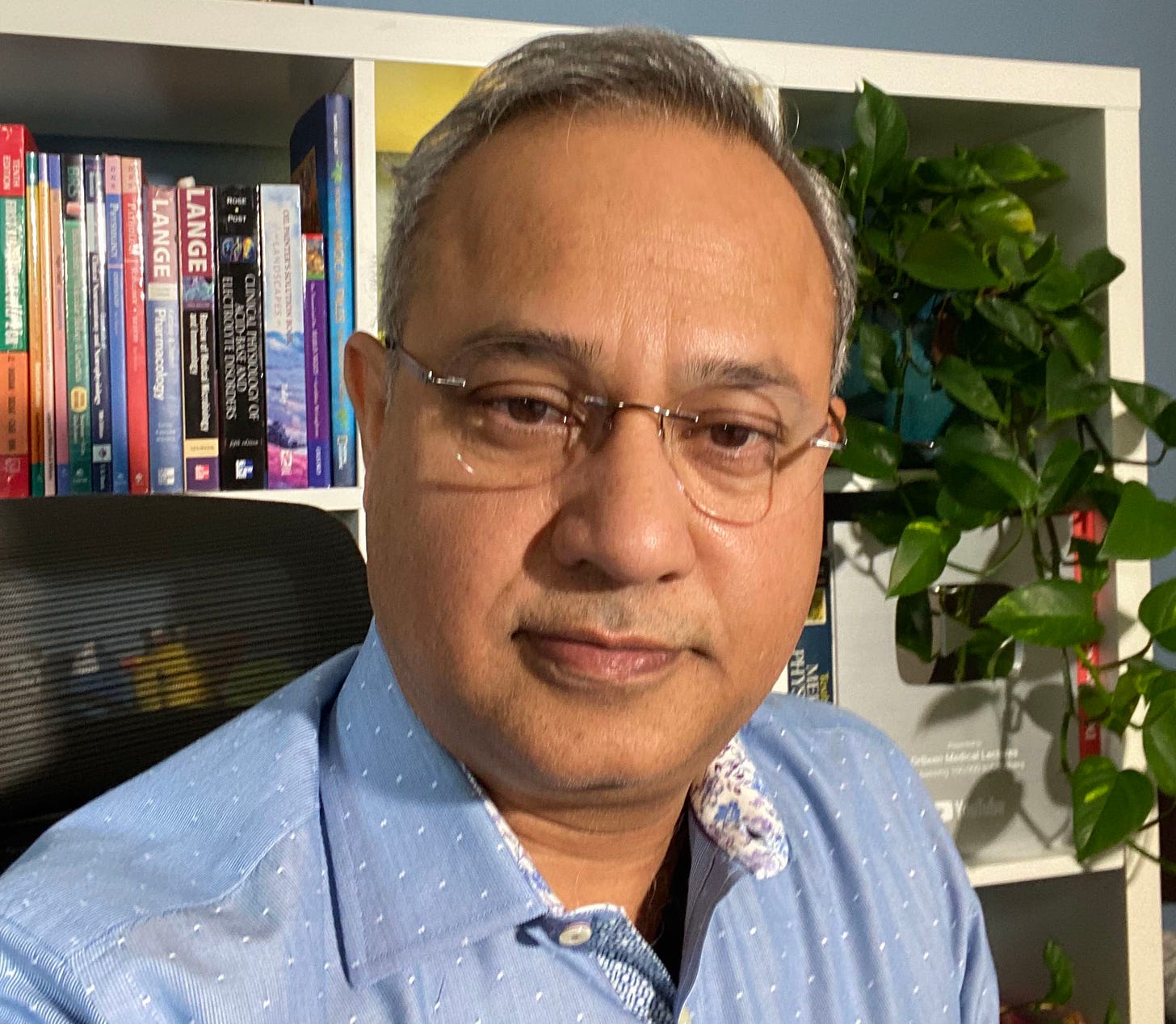
Starting with last summer’s myth about poison-control centers overwhelmed with ivermectin calls, the struggle to obtain ivermectin has intensified. Pharmacy delays and refusals are common, escalating since the FDA’s anti-ivermectin advisory December 24 to state medical boards.
The upshot
It may take some effort and patience, but plan ahead. Here’s how:
Get the supplements. Two well-supported options: FLCCC’s early treatment menu, and Dr. McCullough’s “six things in the over-the-counter toolbox.” These help prevent covid but also are essential if ivermectin, hydroxychloroquine or fluvoxamine are not available. “With Omicron it’s not as critical that you have those (drugs),” Dr. Kory said. However, “they would assure more recoveries and less long-haul.” Yes, in a perfect world.
Assemble a list of potential practitioners. Dr. Marble’s MyFreeDoctor just moved to a new platform that will allow the donation-dependent service to add more doctors. “That is how we go from 500 patients a day [now] to 50,000 a day,” he said. The FLCCC and American Association of Physicians and Surgeons also post lists of doctors.
Search out pharmaceuticals. The appalling practice by pharmacists to flout doctor autonomy and reject prescriptions is forcing patients to order covid generics online. I called a company in India that runs several websites, some of which are listed on a handy how-to-get ivermectin page of the FLCCC.
Mit Patel, a marketer for the Mumbai-based company, said customers are given tracking numbers, and orders will be reshipped if they get waylaid. Three U.S. customers told me the company delivered without a problem.
“Very happy to get ivermectin in this pandemic,” said one. I’d note that these drugs should be taken under supervision of a physician, as I did for my relatively uneventful bout of Covid. I believe the drugs helped assure a quick resolution, since I most certainly was infected with Delta.
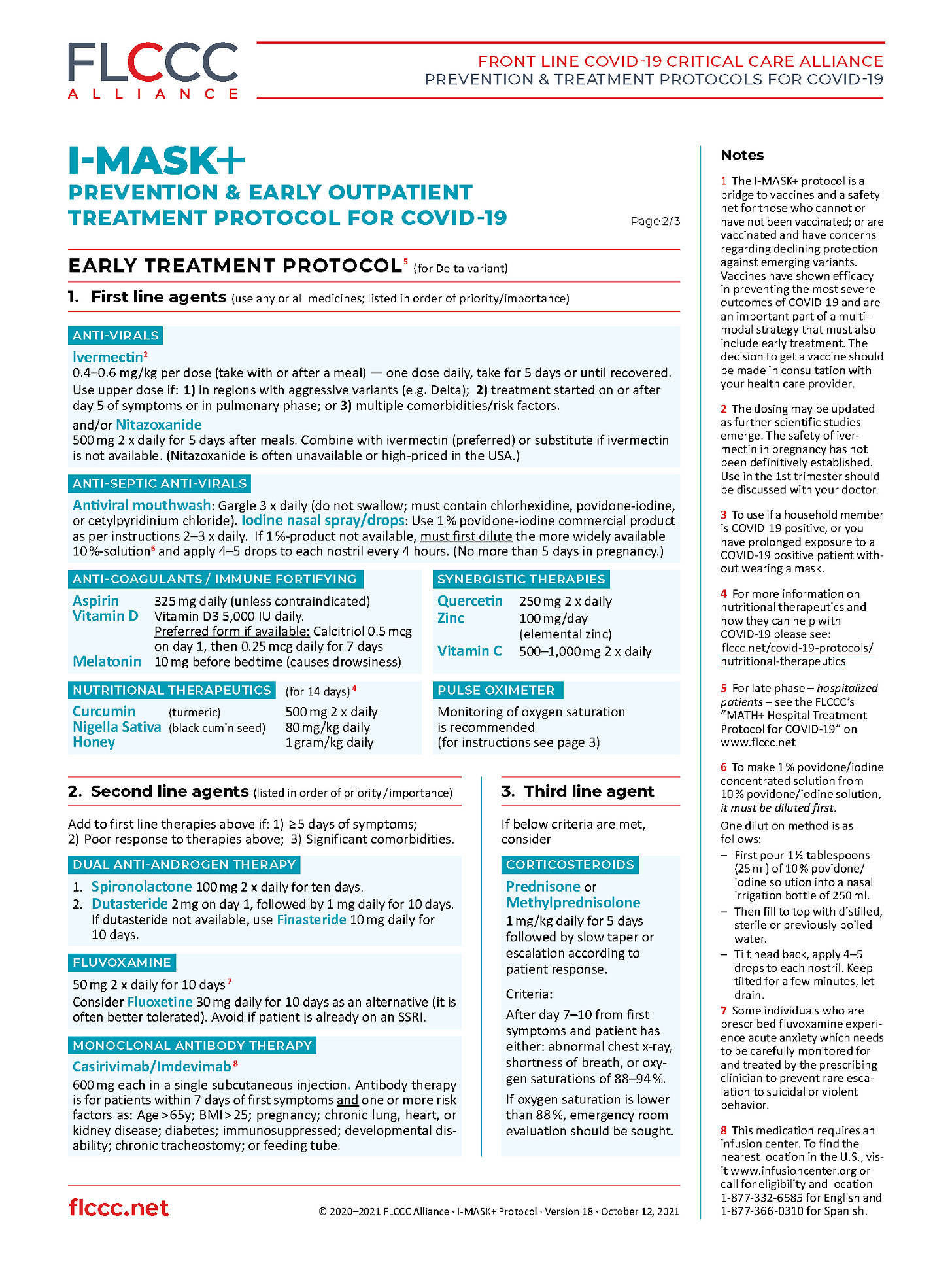
If covid hit, our writer was ready, having bookmarked this page from the FLCCC Alliance months before. (Image Courtesy FLCCC Alliance)
Palpable hope. But.
Some experts are still guarded on covid’s future. Dr. Boros said he is making “no predictions for the future,” while Dr. McCullough said he simply did not know if Omicron will end the pandemic. Some say another mutation could occur; others that it would only make the virus less pathogenic.
As I researched this article, the emails and texts I received, the news I read, and the comments I heard often made me smile and even tear up. The belief that Omicron is the likely end of the pandemic is causing palpable hope, even amid an unprecedented wave of cases.
Omicron is clearly a game-changer. In a large new study by researchers from Berkley and Kaiser Permanente, just 1 in 52,272 Omicron patients died, compared to 14 in 16,982 Delta patients.
In other words, it would take nearly three-quarter million Omicron patients to equal the number who died in that sample of roughly Delta 17,000 patients.
“Compare this to flu, and it is almost nothing,” Dr. Syed said. “The Omicron death rate is tens of times less than flu now, according to the data from the recent California study.”
“We need to think about how we can transition from the current pandemic setting to a more endemic setting,” Marco Cavaleri, chief of the European Union’s vaccines committee said in a press briefing January 13, pointing squarely at Omicron. Cavaleri even said, quite astonishingly, that too many boosters could impair the immune system.
Still, Pfizer promises a likely unnecessary Omicron vaccine by March. Two days ago, I received this text from the New York State Health Department: “Anyone 12+ who received their Pfizer second dose at least five months ago is now eligible for a COVID booster. Get yours today!”
“We know the boosters don’t work against Omicron,” Dr. Paul Marik, a founder of FLCCC, said in an interview, “yet all you hear is get vaxxed and vaxxed and vaxxed.”
So will the drive to jab continue even after the pandemic winds down?
“Yes,” Marik said.
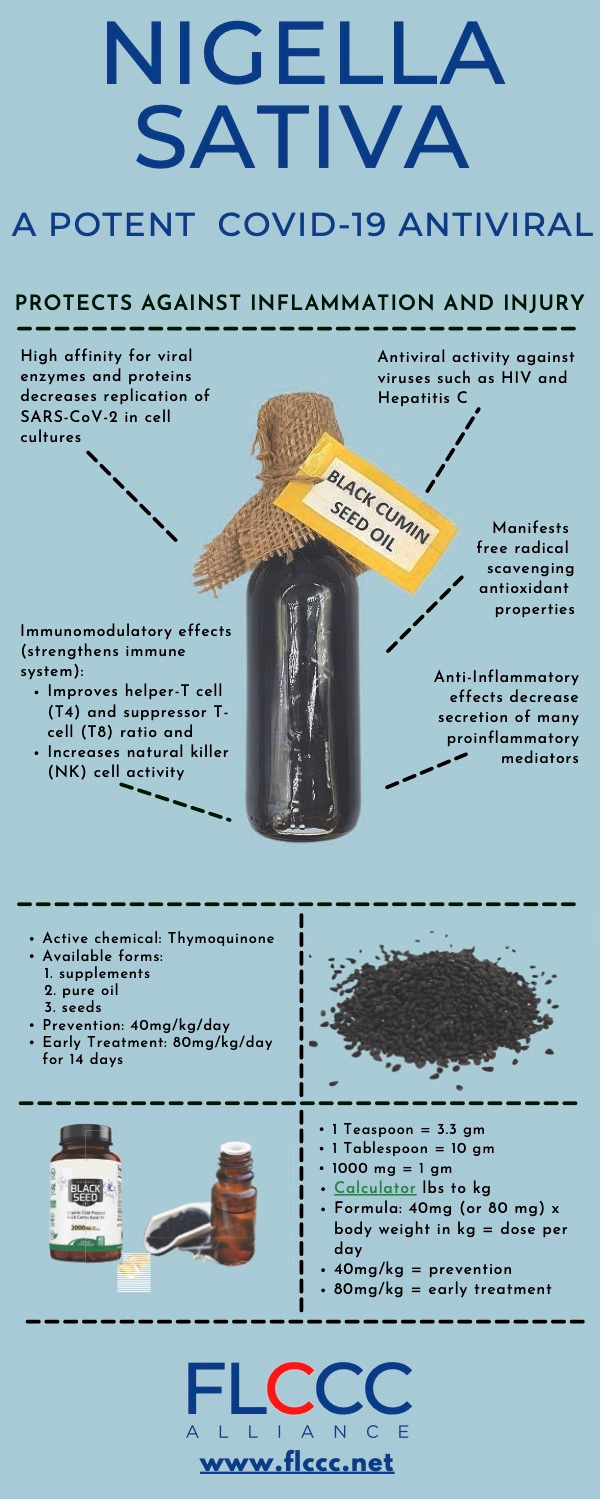
My Covid Cocktail
For the record, below is the protocol I took from day one of my covid symptoms. I was fully better within about a week. I was fatigued and glum for another week, the aftermath, I think, of a brush with a disease with potentially long-term implications. I did lose my sense of smell for several weeks afterward; this resolved when, at the recommendation of Dr. Marble, I took 600 milligrams daily of alpha lipoic acid, a supplement I knew from Dr. Horowitz’s protocol. Marble’s eight months of anosmia had resolved with the supplement.
Ivermectin: 30 milligrams daily, based on 0.4 milligrams per kilogram of my weight, for ten days.
Supplements: Vitamins D and C, zinc, quercetin, curcumin, nigella sativa, honey, and melatonin.
Daily practices: Frequent gargling and nasal rinse.
Famotidine: This was recommended to me by Dr. Malone and is the only drug I took outside the FLCCC protocol; Dr. Kory told me he doesn’t see enough data yet to support it.
Monoclonal Antibodies: I was nearly better when, on day five of symptoms, I got the infusion. I had read the research. It was available back then to people my age. I went for it.
Mary Beth Pfeiffer’s reporting and most recent book, LYME: The First Epidemic of Climate Change, led her to covid-19. Both diseases have been denied and mismanaged in a corrupt health care system. LYME was just released in paperback.





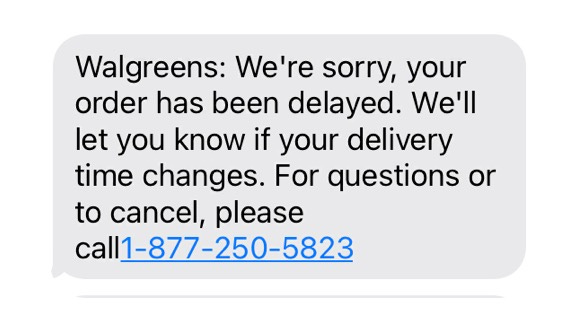
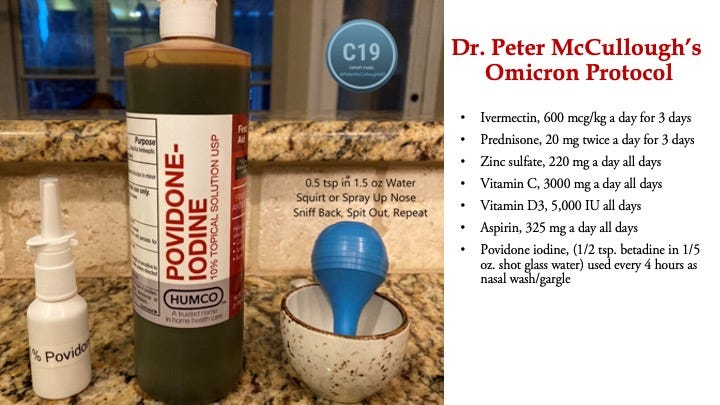

I agree with LouF, this is a great article. Thank you, especially for listing Dr. McCullough's treatment plan -- this makes it so easy for people to assemble their kit or 'toolbox.'
Fantastic piece, I saw this yesterday and shared with many! thank you